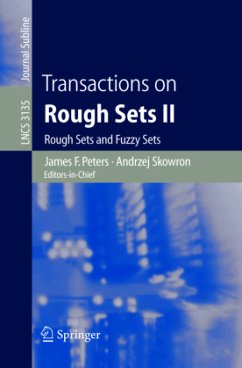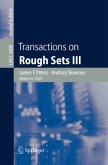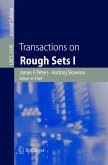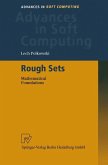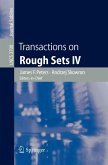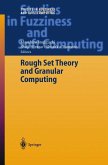The LNCS journal Transactions on Rough Sets is devoted to the entire spectrum of rough sets related issues, starting from logical and mathematical foundations, through all aspects of rough set theory and its applications, such as data mining, knowledge discovery, and intelligent information processing, to relations between rough sets and other approaches to uncertainty, vagueness and incompleteness, such as fuzzy sets and theory of evidence.
This second volume of the Transactions on Rough Sets presents 17 thoroughly reviewed revised papers devoted to rough set theory, fuzzy set theory; these papers highlight important aspects of these theories, their interrelation and application in various fields.
This collection of articles is devoted to fuzzy as well as rough set theories. Both theoriesarebasedonrigorousideas,methodsandtechniquesinlogic,mathem- ics, and computer science for treating problems for which approximate solutions are possible only, due to their inherent ambiguity, vagueness, incompleteness, etc. Vast areas of decision making, data mining, knowledge discovery in data, approximatereasoning,etc., aresuccessfully exploredusing methods workedout within fuzzy and rough paradigms. By the very nature of fuzzy and rough paradigms, outlined above, they are related to distinct logical schemes: it is well-known that rough sets are related to modal logicsS5andS4(Orl owska, E., Modal logics in the theory of infor- tion systems, Z. Math. Logik Grund. Math. 30, 1984, pp. 213 ?.; Vakarelov, D., Modal logics for knowledgerepresentationsystems,LNCS 363,1989,pp. 257?.) and to ?nitely-valued logics (Pagliani, P., Rough set theory and logic-algebraic structures. In Incomplete Information: Rough Set Analysis,Orlo wska, E., ed., Physica/Springer, 1998, pp. 109 ?.; Polkowski, L. A note on 3-valued rough logic accepting decision rules, Fundamenta Informaticae 61, to appear). Fuzzy sets are related to in?nitely-valued logics (fuzzy membership to degree r? [0,1]expressingtruthdegreer)(Goguen,J.A.,Thelogicofinexactconcepts, Synthese18/19,1968 9,pp.325?.;Pavelka,J.,OnfuzzylogicI,II,III,Z. Math. Logik Grund. Math. 25, 1979, pp. 45 ?., pp. 119 ?., pp. 454 ?.; Dubois, D., Prade, H., Possibility Theory, Plenum Press, 1988; Haj ek, P., Metamathematics of Fuzzy Logic, Kluwer, 1998).
This second volume of the Transactions on Rough Sets presents 17 thoroughly reviewed revised papers devoted to rough set theory, fuzzy set theory; these papers highlight important aspects of these theories, their interrelation and application in various fields.
This collection of articles is devoted to fuzzy as well as rough set theories. Both theoriesarebasedonrigorousideas,methodsandtechniquesinlogic,mathem- ics, and computer science for treating problems for which approximate solutions are possible only, due to their inherent ambiguity, vagueness, incompleteness, etc. Vast areas of decision making, data mining, knowledge discovery in data, approximatereasoning,etc., aresuccessfully exploredusing methods workedout within fuzzy and rough paradigms. By the very nature of fuzzy and rough paradigms, outlined above, they are related to distinct logical schemes: it is well-known that rough sets are related to modal logicsS5andS4(Orl owska, E., Modal logics in the theory of infor- tion systems, Z. Math. Logik Grund. Math. 30, 1984, pp. 213 ?.; Vakarelov, D., Modal logics for knowledgerepresentationsystems,LNCS 363,1989,pp. 257?.) and to ?nitely-valued logics (Pagliani, P., Rough set theory and logic-algebraic structures. In Incomplete Information: Rough Set Analysis,Orlo wska, E., ed., Physica/Springer, 1998, pp. 109 ?.; Polkowski, L. A note on 3-valued rough logic accepting decision rules, Fundamenta Informaticae 61, to appear). Fuzzy sets are related to in?nitely-valued logics (fuzzy membership to degree r? [0,1]expressingtruthdegreer)(Goguen,J.A.,Thelogicofinexactconcepts, Synthese18/19,1968 9,pp.325?.;Pavelka,J.,OnfuzzylogicI,II,III,Z. Math. Logik Grund. Math. 25, 1979, pp. 45 ?., pp. 119 ?., pp. 454 ?.; Dubois, D., Prade, H., Possibility Theory, Plenum Press, 1988; Haj ek, P., Metamathematics of Fuzzy Logic, Kluwer, 1998).

